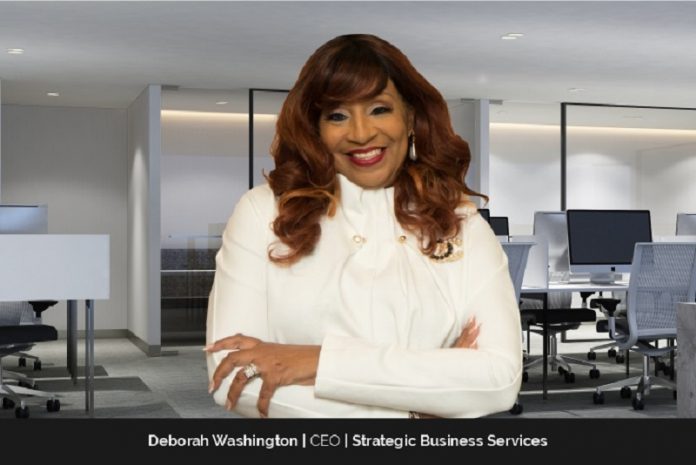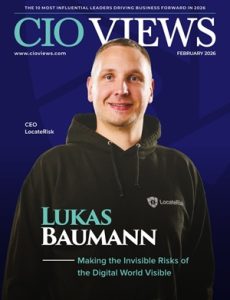Having built loyal teams in the facility management arena for 38 years, she now looks forward to running a new consulting venture “Strategic Business Services” that helps businesses set up their infrastructure and guides them to success.
Becoming an entrepreneur in the facility management industry
Born and raised in New York City, Deborah began her career purchasing facility services for an ad agency, and was courted away by a facility management company that saw her ability to be able to get involved with clients.
Deborah and her lifetime partner and husband of 38 years this year along with their two boys decided n 1990-91, to move to North Carolina when her parents, who were a big part of her support system, decided to retire. She was hired by a minority-owned facility management company, and ended up working with them for about 10 years.
When the owners were ready to retire and sell off the company, they realized that they couldn’t, since Deborah was actually the one running it.
They offered to sell it to her, but she was in no condition to buy a company that was grossing around $12 million dollars a year, and had an evaluation of almost $4 million. So, they offered to hold the note for a period of time, if she would agree to step into the ownership space.
“I did, and I found some financial partners,” says Deborah. “That entrepreneurial experience and responsibilities was what I was already doing, and while the owners golfed, took vacations, the entire trust of the company was in me.”
As an entrepreneur without ownership benefits, she ended up purchasing the company in late 2004, and owned it for about from 2004 until 2010. The company was based in North Carolina, and did business from Virginia, down to South Carolina in the commercial and private sector with clients like Philip Morris, Capital One, GE, and the University of South Carolina.
Deborah had an interest in getting into government because she wanted to make the company a little bit more solid by having private sector and government work. So in 2009, she decided to merge with a partner and was with him for from 2009 to 2012.
The company gained major contracts like Ronald Reagan airport and the city wide for the District of Columbia as well as opening up a market in West Africa but their values differed, so Deborah sold out and got out of that relationship. In 2012-13, she decided to go into consulting helping mid-to-small sized companies establish their infrastructure. However she was approached by another organization in the Washington DC area and ended up taking a position there as their Chief Financial Officer for approximately 3 years. At the end of that period she accepted an offer with Community Bridge, Inc. which is where she is currently retiring from.
She realized that a lot of people go into business because they have a skill that meets the needs of someone. They get thrown into being their own CEO. In their eyes the CEO is just who owns the company and make’s everything work. They don’t understand that the CEO’s major role is to lead the organization and prepare it for sustainability.
“Sometimes the growth causes them to almost implode, because the infrastructural business side is foreign to them, and many important business processes are overlooked, simply because they didn’t know how or the importance of their need. They knew their craft, but they didn’t know the business side,” says Deborah. “And so, for about a year, I would come in and take a look at what their structure was, what their goals were, where they wanted to get to, where they were right now, and what would be some of the roadblocks that we had to fix.”
With her heart firmly in consulting, not wanting to be stuck just helping one company, Deborah accepted a five-year position with another company Deborah as the Chief Operating Officer at Community Bridge, Inc. from 2015 until December of 2021 but ended up staying longer because of the pandemic.
“They lost a lot of their leadership team during the pandemic and things kind of went awry. Fortunately for us, during the pandemic, the team under Deborah’s leadership was able to pivot and bring some services in that the company wasn’t previously offering. And they grew tremendously throughout the last two to three years,” she explains.
With the conviction that she was born to be a leader, Deborah finally got the gumption and guts, listened to God’s plan for her life, and decided to move into the space where she could do this for other companies across the board.
“I have a great desire to help people or help companies that want to be helped. And so, from an entrepreneurial space, it gives me the opportunity to be able to do that and set my own parameters for how that works,” she says.
One of Deborah’s successes was pivoting a total seasonal facility management company from seasonal services to year round services, these additional services included janitorial services, Litter and Debris Removal and COVID Cleaning services
“We picked up over $10 million in contracts during the pandemic in the janitorial division, which really kept the company thriving, because they had lost a lot of their landscaping business,” she says. “ I was able to get the staff certified as COVID Trained Cleaners. As a result we became one of the best known providers for COVID cleanups and the company grew through revenue and profits during the pandemic.”
The challenges of fitting into a male-dominated industry
Deborah recalls how the facility management industry, especially back in the 90s was very male dominated. It was not an industry where you found women at the executive level. Some of the challenges she faced were being taken seriously with regard to knowledge, and not being considered just a person who got a position to meet the female quotas
When she made the move out of advertising and over into the facility management arena, she knew that she had the ability to connect to people but she didn’t have the education or the experience in that field. When her lack of knowledge caught up with her, she realized that she needed to learn the business from the bottom up.
“For about six months, I worked part time in the industry, doing cleaning work, learning how all kinds of services were performed from janitorial to landscaping, to exterminating services and many other services, for no pay,” she recollects. “So I would do my job during the day, and three days a week, I would work four hours at night, in the different contracts that we had, I worked in a uniform like everyone else and did all the task that were required”
Deborah realized that when you don’t really understand what happens in the trenches, you really don’t know how to propose, understand or relate to what a person is dealing with in their day to day duties. You don’t know how to gauge production rates, because you’ve never had your hands involved in it.
So, she did that until she was comfortable and ended up learning more from the base level employees than she did from anybody at the top. She was then able to come back and educate the upper levels on how to do things differently, how some of it could be changed, and how some things could be more successful.
“And it worked out,” she says. “After I did that, I started closing deals for them because when I was going in now to talk to a potential client, I was going in with knowledge and understanding. And I could talk the language and I could make sure that they understood simple stuff, like the difference in different types of floors, the importance of the density of buildings when deciding on a staff, the importance of training and the selection of the right employees. Overall I was able to share a better way to approach processes and procedures. This greatly helped me as a female, to be accepted in a very male dominated industry.”
Another challenge Deborah faced was learning to fit into southern towns in North Carolina when she moved from fast-paced New York, and then 20 years later adapting to a very political environment in DC.
“Those are some of the biggest challenges that I’ve had throughout, just being able to keep the momentum and be able to keep the respect. I love people. So, I think that helps a lot,” she says.
The importance of valuing and motivating people
Deborah also learned how to motivate people, and value them on the levels where that value is important.
“Facility Management is a thankless industry,” she says. “I say that quite often when I speak and talk to people, because everybody notices how something looks, but they never noticed who did it or how much it took to get that done. So, you appreciate when you come into the office that your trash can is emptied, and your floor is cleaned, but nobody ever thinks about the person that actually does that.”
Deborah believes that it’s the people that do the day-to-day work that really makes the success of the company. She realized the plight of those who work in the facility management industry, how quite often they don’t feel good about themselves, and are doing the work because they don’t have the option to do anything else.
Her challenge was to convince facility management organisations to invest in their workers, help them feel better and encourage them in different ways, to develop programs, to educate them, and to award them and acknowledge them to make them feel good.
“You’d be surprised how you get so much more from awarding somebody something and it could be simple. It could be a $50 gift card and a plaque. Or just an acknowledgement of the good work that they have performed sometimes that goes better than actually giving them a raise or anything else,” says Deborah.
She considers one of her biggest achievements as transitioning into ownership of her first company in 2004 with the entire team that the company had, despite the high turnover in the facility management arena. “I had zero turnovers for the first three years that I owned the company. I kept all of the same employees,” she observes.
Deborah believes that it was the result of understanding the value of her team, investing in that team and allowing them the latitude to bring what they’re good at to the table and accepting it.
“I totally understand that,” she says. “I am not the be-all and the answer. Some of these folks that I’ve had on my team are so far ahead of me in certain areas, and being able to encourage them to use that knowledge is, I think, a great accomplishment. I think my overall accomplishment is being able to have a team and develop that team to the best that they can be, while appreciating their efforts during the journey.
Starting a Strategic new venture
Having learned a lot, partly through experience and partly through education, Deborah admits to being very frustrated in the beginning, especially with all the rules and guidelines around business.
But her determined and purpose-driven nature led to her success in moving the past three companies she worked with, from a disorganized, dysfunctional organization, to make them stable and sustainable.
“My move is to offer that on a wider band. My motive was to be able to bring what I’ve learned, some of it through doing it wrong, some of it just from being educated in it,” she says.
Having taken several educational courses from the Kellogg School of Management, Darden School of Management, and Tuck School of Management, she is currently enrolled to start in the Harvard Business Leadership course.
Deborah started her own company called Strategic Business Solutions in 2020 but did mostly pro bono work because of her obligation to Community Bridge. However, she is now up and running and is getting many opportunities from organizations that need the help.
“It makes me feel good, it makes me feel that God is giving me the nod to keep moving he assures me every day that he is my source and he will provide the resources” she says. “My definition of success is to understand and embrace God’s plan for my life, growing to my maximum potential, and sowing seeds into lives that help others. So that’s the space I am in now. It’s a true faith move for me. I trust God that I will fare well, and He’s never let me down.”
Deborah’s new venture is geared toward providing mid to small size businesses with infrastructure and guidance through a partnership group she has put together. Her role is to be the hands-on assessment person, make sure the company is recognized, that the infrastructure is set up correctly and attract the right partners. This is done by a consortium of partners that she has had join her in this venture.
She also hopes to leave a legacy for her children and expand out into other areas of consulting, with her younger son into sports management and sports marketing events, and her elder son a Senior Pastor and executive vice president at a facility management firm.
A master of multitasking
Being in the senior years of their life, with their grown-up sons and grandchildren, Deborah feels that she is in a better state of being able to balance life with her husband. As an ordained minister, she helps in different aspects of ministry in the church and considers herself a master of making it happen, whether it’s Home, Ministry, Work or just having fun with the famiy
“My parents were children of sharecroppers, workers from the south originally, back in North Carolina, and they moved to New York, to start a family and to get better jobs, it was important that they provided a better life for their children” she says. “So I grew up with a dad that worked two or three jobs at a time, with a mom that worked and still balanced the house, so I never knew what it was to not have to do multiple things and do them well.
When she mentors young women, Deborah teaches them that everybody has to make their own decision for what is primary or important in their life. “My priority is first to God, but secondly is to my husband and my family, and then to my ministry,” she says. “But I thank God that I’m at a point now where the balance is a lot easier.”
Lead with your abilities
Having worked with male-owned businesses all her life, Deborah thinks of herself more in terms of her abilities and what she brings to the table. She believes that women are some of the most determined and hard-working people and when people are impressed with your ability, they forget what your gender or ethnicity is.
In Genesis 1:27 it says
So God created man in His own image; in the image of God He created him; male and female He created them.
“So with the understanding of how God created us I don’t want to come in and impress you as being a woman. I want to come in and impress you with my knowledge and what I’m able to do, and hey, by the way, I’m female,” she says. “Don’t position yourself as a minority owned firm, position yourself as a good firm that can meet their needs. And hey, here’s another advantage. If you’ve got minority dollars you’re trying to spend, then I meet that too. But that’s not why I’m here. I’m here because I can meet your needs regardless of what it is.”
Deborah encourages women to go in and impress folks with what they bring to the table, not who they are, gender or otherwise. “I think there is going to come a day, and I think it’s coming soon, where people will not care. And it won’t be this disparity between men and women. It’s really going to rest on the abilities of what a person can do,” she states.





